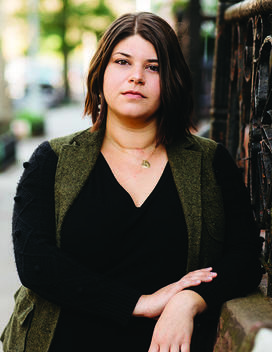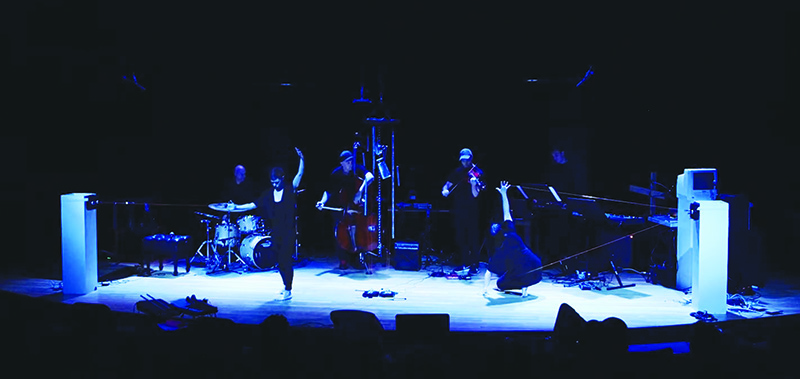Alyssa Weinberg *22 Wrote an Opera About Climate Change
‘Drift’ explores themes of climate change, migration, and motherhood

Climate change is raising temperatures and sea levels around the world, but it’s also threatening the memories held by society and by nature itself. That’s the premise behind Drift, a forthcoming opera that composer Alyssa Weinberg *22 is developing with librettist J. Mae Barizo, who created the story.
Drift explores themes of climate change, migration, and motherhood through the eyes of a character who represents the memories and experiences of those who have been uprooted. “It’s about drifting across these borders that don’t actually exist anymore, about traveling in the broadest sense of the word, both physically and metaphorically,” Weinberg says.
In April 2022, the project earned Weinberg an Opera America Discovery Grant. She was one of eight women to receive the grants, which support female composers who are developing new works in opera and musical theater.
Unlike traditional operas, Drift will be a multidimensional work, featuring elements such as prerecorded voices of the characters and video that play with the audience’s perceptions. “It’s going to change what we think is happening or not, or if we think we’re living in a fixed reality,” Weinberg says. “When you think about all of these elements from the very, very beginning of an idea, it opens up so many more possibilities. I just think it’s so powerful when we can combine more of these elements together, provided that they’re done in an organic way where we’re all trying to serve the same goal.”
That holistic approach to composing has become second nature to Weinberg. “These days, it’s just the way that I imagine a piece,” she says. “I imagine all those elements; I imagine the experience.”
Imagining more than just notes on a page is perhaps Weinberg’s biggest takeaway from her Ph.D. studies in composition at Princeton. She had already done stints at the Manhattan School of Music and the Curtis Institute of Music, so she didn’t need someone to teach her how or what to compose. “You’re there really to do your own work and learn something new from each other and contribute to the community,” she says of the University’s program.
Learning and contributing were certainly central to her submission to the annual Generals Concert, where Ph.D. students present new works they’ve written in response to works by established composers. “The point of that wasn’t to come away with an awesome, groundbreaking recording of a thing that’s going to go be submitted and win you a Pulitzer or something,” Weinberg says. “The point was to see what would happen if you tried something new.”
And what she tried was certainly new. Her project, Tethered, includes a sound sculpture, an interactive sculptural object used as a sonic instrument.
“For my Generals piece, I wound up building a sound sculpture that we hung from the ceiling over the concert hall,” she says. “I performed alongside classmate Jenny Beck and collaborated with Mike Mulshine, who designed all the coding and Max patches (an interactive visual programing language) for the piece.” Technology was important since the performers wore motion-sensor rings that shaped the sound. Two cellists, meanwhile, improvised music based on what Weinberg and Beck were doing.
“That was like the craziest, scariest thing I’ve ever done,” she says. “That’s not going to be the way that I primarily engage with my work, and it’s not the thing I’m expert at, but it definitely shifted what I now think I’m capable of.”
Drift was originally intended to be Weinberg’s dissertation project, staged as part of a pilot program to perform works by composition students in the Lewis Center for the Arts’ new Wallace Black Box Theater. But COVID-19 intervened, and the campus shut down. “Having unmasked, super-spreader humans singing in a room full of people was the last thing to get approved once we were trying to come back,” she says.
Rather than delay her dissertation until the theater reopened, Weinberg wrote a new work: Isola, a 45-monodrama with text by Barizo that featured a multitracked soprano soloist, video projections, a string trio, and electronics. Along the way, she also taught herself Ableton Live, audio software that lets composers write, record, arrange, and mix. (It’s often used in live performances.)
Early in her work on Isola, Barizo learned that she’d been named an inaugural IDEA (Inclusion, Diversity, Equity, and Access) Opera Resident Artist by Opera America. That support, coupled with Weinberg’s Discovery Grant, has given the collaborators freedom to focus on Drift without worrying about next steps. “We have no presenter, no commission; no opera company has partnered with us quite yet,” Weinberg says.
What they do have is a solid start on a new work about an urgent topic.
“How can you not write about this?” Weinberg says. “How can you think about the future and assume that the Earth will still be here?”










No responses yet